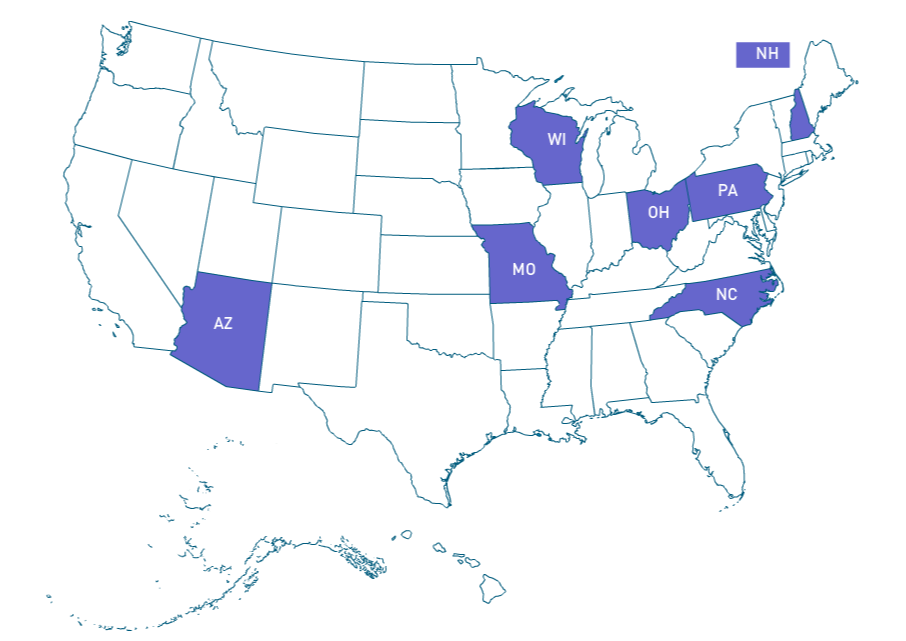by Mitchell Hirsch, NELP Action Fund
A coalition of progressive advocacy groups has launched a campaign to make boosting workers’ pay a pivotal issue in the 2016 elections. Looking to leverage strong public support for minimum wage increases, the effort will spotlight candidates’ positions on substantially raising the federal minimum wage and protecting a major expansion of overtime pay coverage.
With control of the U.S. Senate in the balance this election year, the groups are targeting Senate contests in at least seven battleground states where Republicans who have blocked minimum wage increases, and whose party leaders in the Senate threaten to roll back overtime pay guarantees for millions of workers, are seeking reelection.
Led by the National Employment Law Project Action Fund, the Center for Popular Democracy Action Fund, and the Working Families Organization, the campaign intends to make raising wages a decisive issue in several key Senate races, working with grassroots groups in Wisconsin, Pennsylvania, Ohio, North Carolina, Missouri, Arizona, and New Hampshire.

7 battleground states where coalition of progressive advocacy groups are challenging incumbent Republican Senators on issues of raising workers’ pay.
The effort received national attention over the weekend with a report in the Wall Street Journal.
“There’s unprecedented momentum this year for raising the minimum wage. Voters are hungry for leaders who’ll take a strong stand in raising wages and frustrated with their Republican majorities in Congress,” said Paul Sonn, a spokesperson for the National Employment Law Project Action Fund.
While the focus is on Senate races, “partners in this effort are educating voters on where candidates for office from president down to city councilperson stand on raising wages,” said Mr. Sonn, who added that Hillary Clinton is a strong supporter of raising the federal minimum wage while Donald Trump “has been all over the map.”
With control of the Senate hanging in the balance after Republicans won the majority in 2014, the groups are betting minimum wage could be a pivotal issue in key races in Pennsylvania, Missouri, Wisconsin, Ohio, Arizona, New Hampshire, and North Carolina.
. . . .
Republicans are defending 24 Senate seats this November, while Democrats are defending 10. Democrats need to win at least five net seats to gain back control from Republicans, or four if Hillary Clinton wins the White House and Tim Kaine is elected vice president and can break tied Senate votes.
Some of the lawmakers the groups plan to target because of the lack of support they’ve shown for higher minimum wages are Arizona Republican Sen. John McCain, who is in a contest against Democratic Rep. Ann Kirkpatrick, and Missouri Republican Sen. Roy Blunt, challenged by Democrat Jason Kander.
In Pennsylvania, GOP Sen. Pat Toomey could feel some heat from the groups in his race against Democrat Katie McGinty, who has repeatedly called for raising the federal minimum wage. And in Wisconsin, they will target Republican Sen. Ron Johnson in his contest with Democrat Russ Feingold, who has made raising the minimum wage a pivotal part of his campaign.
Marina Dimitrijevic, the state director of the Wisconsin Working Families Party, one of the grassroots groups involved, said the organization plans to bring a crowd to a mid-October debate between Sen. Johnson and Mr. Feingold. It will also invite Mr. Johnson to a roundtable discussion about raising minimum wages.
“I hope he comes and listens,” she said.
The federal minimum wage is $7.25 an hour, and leading Democrats in Congress have gained no traction on bills to increase it. Pay floors have been rising in cities and states instead to as high as $15 an hour.
Of the 24 Republican-held Senate seats that are up in the 2016 election, 22 of them are held by incumbents seeking reelection. They include all seven of the Republican incumbents in races targeted by groups pressing for a higher federal wage floor. All seven of those incumbent senators voted to block a federal minimum wage increase from $7.25 to $10.10 in 2014, and have stood by Senate Republican leaders’ refusal to consider any legislation to raise the federal wage floor ever since.
Sixteen Republican-held Senate seats up in this election are in states that are among the 21 states stuck at the $7.25 federal minimum wage, including fourteen where Republican incumbents are running for reelection. Another seven states with only slightly higher state minimum wages have Republican incumbents seeking reelection.
In the 24 states with Republican-held Senate seats up in this election, 27 million workers are paid less than $15 per hour, including nearly 20 million who are paid less than $12 an hour. In the seven states targeted for the workers’ wages issue focus, more than 10 million workers earn less than $15 per hour, including more than 7 million who are paid less than $12 an hour.
The seven states selected by the groups for the campaign’s election cycle focus are among those considered the most competitive Senate races. Their outcomes will likely decide who holds the Senate majority in the next Congress.
Arizona: Sen. John McCain (R) vs. Ann Kirkpatrick (D)
Missouri: Sen. Roy Blunt (R) vs. Jason Kander (D)
New Hampshire: Sen. Kelly Ayotte (R) vs. Maggie Hassan (D)
North Carolina: Sen. Richard Burr (R) vs. Deborah Ross (D)
Ohio: Sen. Rob Portman (R) vs. Ted Strickland (D)
Pennsylvania: Sen. Pat Toomey (R) vs. Katie McGinty (D)
Wisconsin: Sen. Ron Johnson (R) vs. Russ Feingold (D)
As Labor Day approaches, marking the start in earnest of campaign season, the groups plan to drive a media narrative on the potentially game-changing impact of raising workers’ pay as a pivotal election issue.

